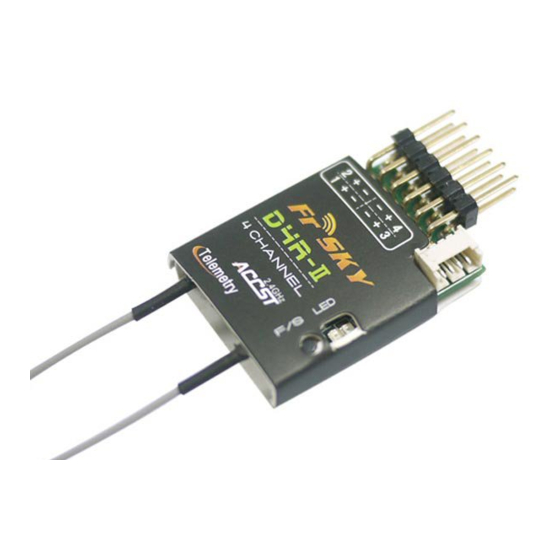Table of Contents
Advertisement
Quick Links
1. 1. 1. 1.
Introduction
Introduction
Introduction
Introduction
1.1
1.1
1.1 Compatibility
1.1
Compatibility
Compatibility
Compatibility
Compatible with FrSky two way telemetry modules: DFT, DJT, DHT, DHT-U
1.2
Specifications
1.2
1.2
1.2 Specifications
Specifications
Specifications
Dimension: 40*22.5*6mm
Weight: 5.8g / 5g (naked)
Operating Voltage Range: 3.5V-10.0V
Operating Current: 60mA
Operating Range: Full Range (>1.5km)
Resolution: 3072 (>11bit)
1.3
1.3
Features
Features
1.3
1.3 Features
Features
1) 1) 1) 1) Firmware
Firmware
Firmware
upgradeable;
upgradeable;
Firmware upgradeable;
upgradeable;
2) 2) 2) 2) One
One
external
analog
One external
One
external analog
external
analog telemetry
analog
Hub
Hub
Hub
Hub FSH-01);
FSH-01);
FSH-01);
FSH-01);
3) 3) 3) 3) RSSI
RSSI
RSSI
RSSI (PWM)
(PWM) and
(PWM)
(PWM)
and
and CPPM
and
for
for
CH1~CH8
CH1~CH8, , , , and
CH1~CH8
and
and
CH2
CH2
will
will
for
for CH1~CH8
and CH2
CH2 will
will output
4) Lighter weight and physically smaller than D8R-II plus & D6FR;
5) Alarm warning on low voltage, poor reception, etc.
2. 2. 2. 2.
Set
Set
up
up
Set
Set up
up
2.1
2.1
2.1 Bind
2.1
Bind
Bind
Bind procedure
procedure
procedure
procedure
1) Ascertain that the transmitter is in the PPM mode. Turn the transmitter off.
2) Turn on the transmitter while holding the F/S button on the transmitter module (Ensure that both switches
on the transmitter module are OFF when using this receiver in the two way mode). Release the button. The RED
LED on the transmitter module will flash, indicating the transmitter is ready to bind to the receiver.
3) Connect battery to the receiver while holding the F/S button on the receiver. The LED on the receiver will
flash, indicating the binding process is completed. Turn off both the transmitter and receiver.
4) Turn on the transmitter and connect the battery to the receiver. The GREEN LED on the receiver will
indicate the receiver is receiving commands from the transmitter. The receiver/transmitter module binding will not
have to be repeated, unless one of the two is replaced.
2.2
Range
check
2.2
2.2 Range
2.2
Range check
Range
check
check
A pre-flight range check should be done before each flying session. Reflections from nearby metal fences,
concrete buildings, or trees can cause loss of signal both during the range check and during flight.
The following steps are to be followed to perform the range check of the model before flight:
1) Place the model at least 60cm (two feet) above non-metal contaminated ground (e.g. on a wooden
bench).
2) The receiver antennas should be separated in the model, and not touching the ground.
3) Place the antenna of the transmitter in a vertical position.
4) Turn on the transmitter and receiver, press the F/S button of the transmitter for 4 seconds to enter range
check mode, the RED LED of the transmitter module will be off, GREEN LED will flash rapidly, and the BEEPER
will sound. The effective distance will be decreased to 1/30 of full range.
5) Walk away from the model while simultaneously operating the controls on the transmitter, confirming that
all controls operate normally.
6) Press the F/S button for 1S-4S to exit range check mode, RED LED will be back on, indicating normal
operation is back.
Instruction
Manual
Instruction
Instruction Manual
Instruction
Manual
Manual for
telemetry
port
and
one
telemetry port
telemetry
port and
port
and
and one
one
one digital
CPPM
CPPM output
CPPM
output
output
output - - - - If If If If CH3
CH3
CH3
CH3 and
and
and
and CH4
output
output
RSSI
RSSI
(PWM);
(PWM);
output RSSI
RSSI (PWM);
(PWM);
for
FrSky
D4R-II
for
for FrSky
FrSky
FrSky D4R-II
D4R-II
D4R-II
digital
data-stream
port
digital
digital data-stream
data-stream port
data-stream
port (connect
port
CH4
CH4 are
CH4
are
are
are connected
connected
connected
connected by
by
by a a a a jumper,
by
www.frsky-rc.com
21/02/12
(connect to to to to FrSky
(connect
FrSky
Sensor
(connect
FrSky
FrSky Sensor
Sensor
Sensor
jumper,
jumper,
jumper, CH1
CH1
CH1 will
CH1
will output
will
will
output CPPM
output
output
CPPM
CPPM
CPPM
Advertisement
Table of Contents

Summary of Contents for FrSky D4R-II
- Page 1 1. 1. 1. 1. Introduction Introduction Introduction Introduction 1.1 Compatibility Compatibility Compatibility Compatibility Compatible with FrSky two way telemetry modules: DFT, DJT, DHT, DHT-U Specifications 1.2 Specifications Specifications Specifications Dimension: 40*22.5*6mm Weight: 5.8g / 5g (naked) Operating Voltage Range: 3.5V-10.0V Operating Current: 60mA Operating Range: Full Range (>1.5km)
- Page 2 Failsafe is a useful feature in which all controls move to a preset position whenever the control signal is lost for a period of time. D4R-II supports failsafe function for all channels. Follow the steps below to set failsafe positions for each channel: 1) Bind the receiver first and turn on both the transmitter and receiver;...

















Need help?
Do you have a question about the D4R-II and is the answer not in the manual?
Questions and answers